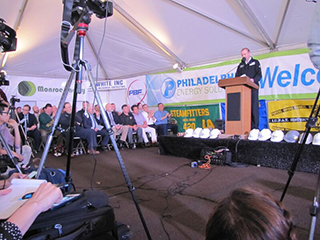Seven years ago Philadelphia oil refinery workers and the USW fought hard to keep three refineries open. New owners purchased two of the refineries and one turned into a terminal.
Now, the mechanism used to track compliance with the Renewable Fuel Standard (RFS)—Renewable Identification Numbers (RINs)—is threatening to shut down the Philadelphia Energy Solutions (PES) refinery.
PES does not have the capacity to blend biofuels like ethanol, so it must purchase RIN credits on the open market. RIN prices have fluctuated between one to two pennies a gallon of ethanol and as high as $1.40 a credit.
In 2017 alone, PES said it spent about $218 million on RINs. This was more than twice the company’s payroll, almost one-and-a-half times its average annual capital expenditures and four times its interest expense. Crude oil is PES’s only expense that is larger than its RINs cost.
In late January, PES filed for Chapter 11 bankruptcy and blamed RINs costs. On March 12, the Environmental Protection Agency (EPA) allowed the company to pay roughly half of the $350 million in RFS compliance costs it owed. In addition, the agency will hold PES under stricter compliance guidelines moving forward.
The Pennsylvania Department of Revenue filed with the bankruptcy court on March 16 a request for payment of delinquent fuel taxes. The estimated unaudited amount—$3.8 billion—is quite high compared to the $43 million in cash on hand when the refiner filed for bankruptcy.
 With the bankruptcy in mind, PES and USW Local 10-1 invited Republican Senator Ted Cruz of Texas to a Feb. 21 rally so he could press the Trump administration into revising proof of compliance with the RFS. Cruz has been a leader in the effort to reform the RFS He has organized meetings with administration officials.
With the bankruptcy in mind, PES and USW Local 10-1 invited Republican Senator Ted Cruz of Texas to a Feb. 21 rally so he could press the Trump administration into revising proof of compliance with the RFS. Cruz has been a leader in the effort to reform the RFS He has organized meetings with administration officials.
At the rally, Cruz said that “a RIN is not a commodity…it’s a made-up government license.” Cruz has suggested placing a 10-cent cap on a RIN. This would save refiners millions of dollars, but the biofuels industry rejected it as being unworkable.
USW Local 10-1 President Ryan O’Callaghan said the rally resulted in a meeting with President Trump, where he mediated a discussion between the ethanol industry and the refining sector. O’Callaghan represented organized labor, and there is hope of a beneficial resolution.
At the meeting, refiners suggested a fixed two-year price cap for RINs. To overcome opposition from the farm and renewable fuel groups over the refiners’ proposal, there is new discussion around a triggered price cap. This would involve an EPA waiver to expand sales of 15 percent ethanol gasoline blends. Included in the plan is an incentive for those sales by attaching a multiplier to increase the number of RINs to help lower refiners’ RIN costs.
Amidst the political uncertainty over RINs, their cost has fallen nearly 40 percent in recent weeks to the current trading price around 42 cents each.
PICTURED: Philadelphia Energy Solutions Chief Executive Officer Gregory Gatta addresses the rally. Photos by Peter Denesowicz, PPD Associates
